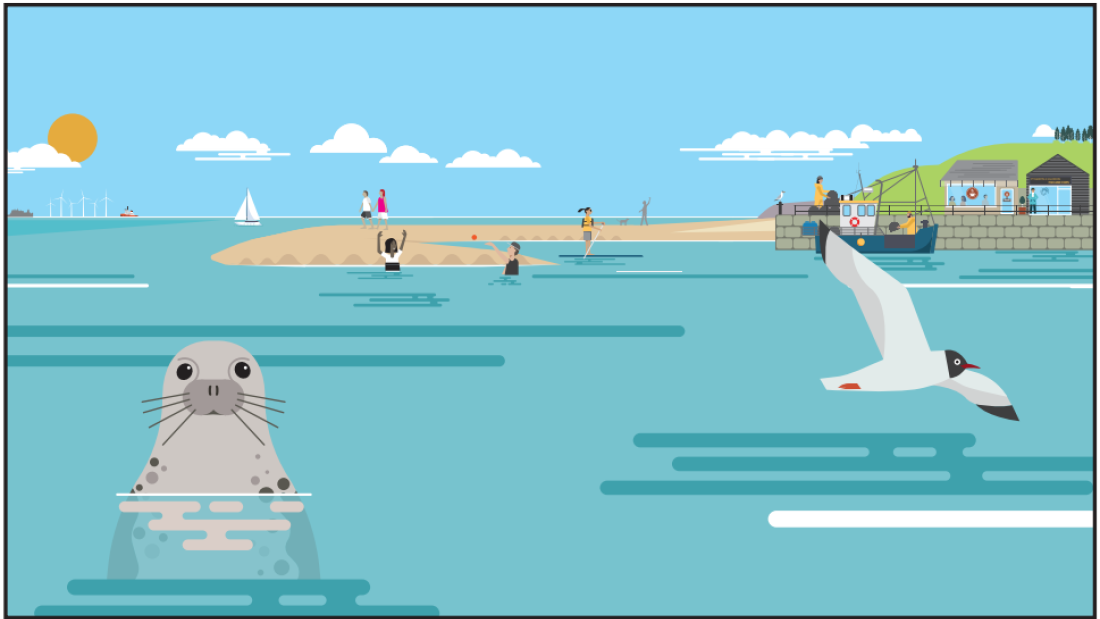The first of its kind in the UK, ‘Y Môr a Ni’ (The Sea and Us) combines the knowledge and experience of 22 organisations including NRW (Natural Resources Wales), Welsh Government, The Marine Conservation Society, North Wales Wildlife Trust and academics from the University’s School of Ocean Sciences and the Places of Climate Change Research Centre (PloCC) and Cardiff University working together as the Welsh Ocean Literacy Coalition to build awareness of our influence on the sea and the sea’s influence on us.
The more connected people feel to the sea, the more conscious people become about their individual and societal effects on marine and coastal environments. This can lead to behavioural changes that safeguard and protect these important natural spaces as well as all the benefits they provide.
On behalf of the ocean literacy team at the School of Ocean Sciences, honorary Research Fellow Dr Liz Morris-Webb said,
“I would like to thank CASP for leading the way with Y Môr a Ni, and to all those involved. It has been an exciting opportunity to be a part of the co-creation process, developing a vision and pathway to a Wales that is better connected with its surrounding waters. Restoring society’s relationship with the ocean through nurturing our connection with it and inspiring people to understand it is an essential step towards keeping our planet habitable, and I am pleased that Wales, the Welsh Ocean Literacy Coalition and specifically Bangor University, are leading the way”
Blue spaces, like the sea and the coast, provide areas that can improve your physical and mental wellbeing as well as providing a variety of habitats and species, some of which are only found in the UK. The School of Ocean Sciences at Bangor University is committed to protecting these through education of the next generation of marine scientists and inspiring the public to be marine stewards of the future. Currently working with the Zoological Society of London (ZSL) the Wild Oysters Conwy Bay project aims to help restore native oyster populations in North Wales with the support of 122 citizen scientists encouraging local communities – schools, universities and residents - to get involved in nature conservation. More than 9,760 members of the public and nearly 2,790 students have engaged with the project through the delivery of interactive workshops, educational sessions, and public events and student education programmes, all aiming to promote a better understanding of how to care for our ocean.
These marine environments support local industries, contributing to the food and energy sectors and providing jobs, especially in tourism hotspots. Through early engagement with stakeholders and collaborative community projects the School of Ocean Sciences and PloCC aims to enable individuals, communities, and businesses to change their relationship with the sea.
In addition to its work to support Gwynedds fisheries and aquaculture sector the Môr Ni Gwynedd launched the first-ever Pentre Bwyd Môr/Seafood Village at the Gwyl Fwyd/Caernarfon Food Festival last summer, a collaborative effort bringing together academic research, culinary arts, and community engagement to celebrate our sealife and coastal heritage.
Deputy First Minister with responsibility for Climate Change, Huw Irranca-Davies said, “The Welsh Ocean Literacy Coalition’s new framework, funded by the Welsh Government, is crucial for helping more people understand the importance of the sea, its influence on our daily lives, and how our actions can impact upon it. The sea benefits our health and wellbeing, energy, fishing and aquaculture, and so much more. I look forward to seeing the results of this collaborative work to safeguard our critical marine and coastal ecosystems.”

Bangor University championing UK’s first ocean literacy strategy
This week sees the Wales Coasts and Seas Partnership (CaSP Cymru) launch an Ocean Literacy framework for Wales aiming to grow people's relationship with our coasts and seas.
